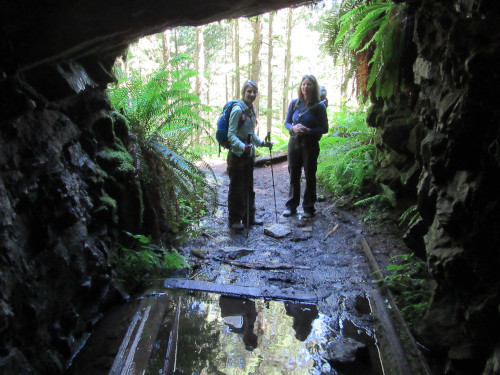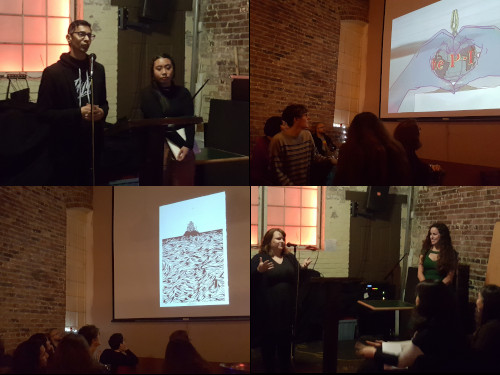SUBSCRIBE TO THE FREE NEWSLETTER
Cascadia Magazine is now a federal non-profit!
We recently received formal notification that Cascadia Magazine is now officially a 501(c)(3) non-profit, meaning that donations are now tax deductible for all US taxpayers. We rely on donations from our readers to bring you this newsletter and all the in-depth journalism, poetry, essays, fiction, and photography you find at Cascadia Magazine. If you want to make contribution before the end of the year, you can do so at our donate page.
And if you’re already a contributing reader, thank you!
Get Outside: Old Mine Trail

Don’t let the arrival of winter stop you from getting out on the trails of Cascadia. We’ve got scores of winter hiking suggestions in Cascadia Magazine’s online hiking archive. And this week, columnist Craig Romano recommends the Old Mine Trail, a little-known but easy hike in Washington’s Mount Rainier National Park. Just past the Carbon River entrance, this all-season hike takes you through gorgeous old-growth forest and leads to an old mine shaft from the late 19th century. If you’re in the Puget Sound area, check it out! Find the full write-up, driving directions, and photos here.

Cascadia Magazine’s Writers + Artists event last week at Vermillion in Seattle featured a great combo of writers and visual artists talking about their work in combination…Shankar Narayan & Monyee Chau explored the ways they push against cultural assimilation, Clare Johnson’s quirky dark images were paired with Ruth Joffre’s flash fiction, and Sarah Salcedo created a unique illustration for Kristen Millares Young’s essay. Thanks to all who participated and to the Seattle Office of Arts and Culture for a grant to make this happen! You can view all the artist/writer combos published online at Cascadia Magazine.
Squamish housing project in Vancouver and other housing news
Vancouver Sun reports that the Squamish First Nation approved leasing out lands it holds in the Kitslano neighborhood of Vancouver, that could create some $3 billion in housing. Meanwhile a think tank concludes that Vancouver needs 10,000 new units of affordable housing to deal with its housing crisis. In related news the city of Seattle announced a record $110 million in new affordable housing units in its latest budget. The Stranger reports that the Washington legislature may take up limits on rent increases (much as Oregon did last year) or face a ballot initiative. And the Idaho Statesman notes that home prices in Boise reached record levels this year, with the average price of a home doubling over the past 10 years.]
Sending OR foster kids out of state increased chance of abuse
OPB keeps up reporting on the crisis in Oregon’s foster care system, with a detailed report on how sending foster kids out-of-state to contracted care increased rates of neglect and abuse. Investigate West’s reporting over the past two years on the flawed system in Washington resulted in the legislature passing some $48 million in improvements.
Closing the Indigenous internet gap in BC
Katie Hyslop, reporting for the Tyee, looks into efforts to close the gap in internet access among First Nations in British Columbia–nearly two thirds of people in Canada’s Indigenous communities don’t have basic access. A $50 million project in BC aims to add service in rural and First Nations communities.
Portland considers fee-free transit
Portland Mercury notes that officials at Tri-Met, the transit agency for Portland’s greater metropolitan area, are considering making all public buses, light rail and other transit free in order to create social equity and encourage use in the era of climate change. Meanwhile, Olympia, WA announced it’s making all its buses and Dial-a-Lift services free (fares now account for less than two percent of that transit system’s revenue).
The man who watches vultures
Hakai magazine has a great feature about Dave Manning, a self-taught naturalist living on North Pender Island, BC who’s fascinated with turkey vultures. After a long migration from South America, turkey vultures breed on Vancouver and surrounding islands, and Manning has a wealth of information on the nesting habits of these fascinating creatures. More on their annual migration across the Straight of Juan de Fuca can be found here.
Maya Jewell Zeller on being a writer who grew up in poverty
Humanities Washington’s blog has a great essay, “The Privilege Button,” by Maya Jewell Zeller, who’s based in Ellenburg, WA. She looks at what it means to be in the literary world with a childhood growing up without much money–not having the cultural language and knowledge that comes with a privileged background. “Wrote Lorca: “One must awaken the duende in the remotest mansions of the blood.” My blood is sort of more like a trailer park.”
On being Indian-Candian in BC by Kim Dhillon
At Room, read “Dazzle Camouflage” by Kim Dhillon, who lives on Vancouver Island and looks at the complexities of her South Asian/British heritage in a place that is sometime befuddled by cultural nuance. “And so, I am the kind of Indian who can speak only English, because my father thought he was giving me an advantage in masking out the Punjabi from my tongue.”
Poetry by Alison Jennings
Seattle-based poet Alison Jenning’s “Playing Hooky from the Should,” is online at Cathexis Northwest Press, a meditation on Allen Ginsberg’s quote, “stay irresponsible”:
“I pray
for dispensation –
no, absolution –
from the should…”
That’s this week’s curated assortment of poetry, arts, culture, environmental writing, news, and politics from across the Cascadia bioregion. Hope you have a good week as we approach winter solstice on Sunday (longer days, yay!) ❄️ –Andrew Engelson
Photo credits: scenes from the Writers + Artists event by Andrew Engelson, hikers on Old Mine Trail by Craig Romano
